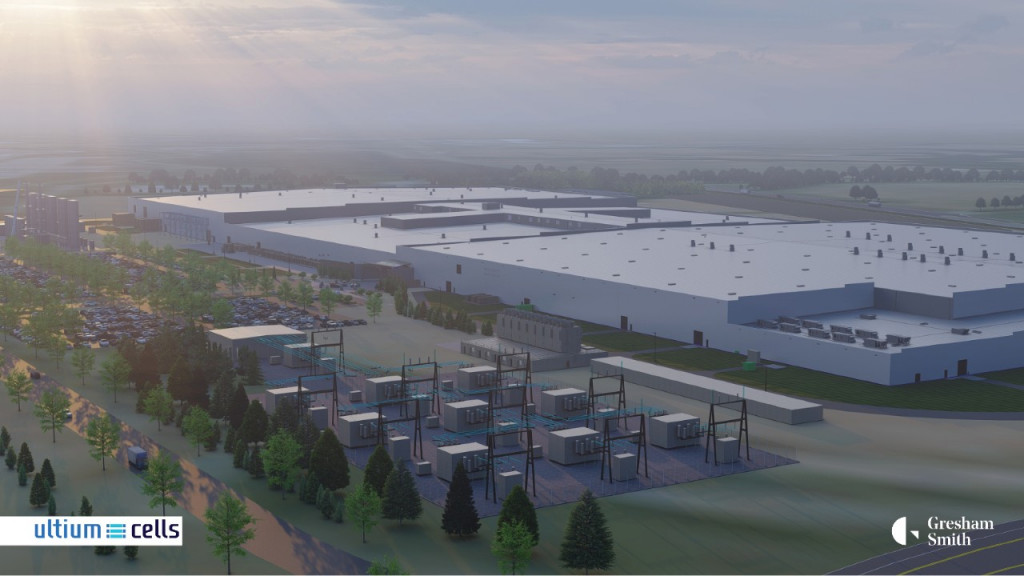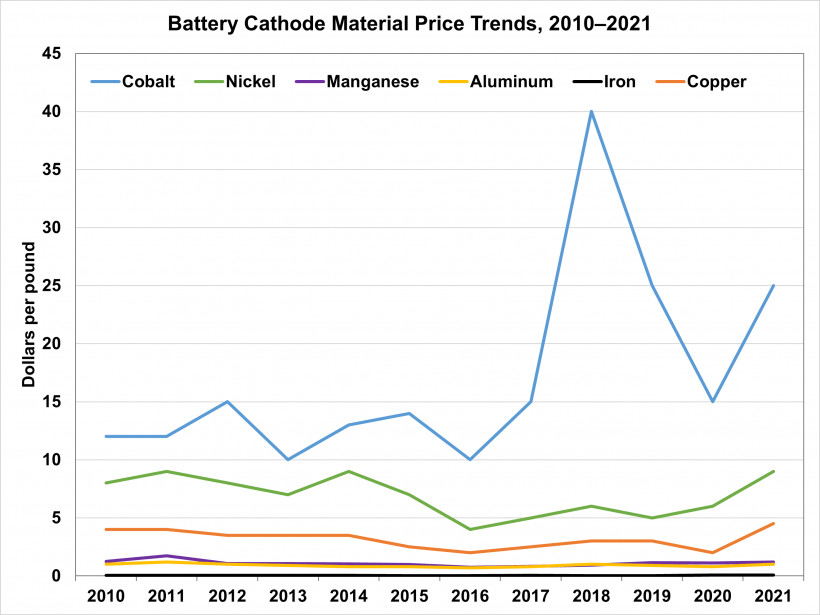LG Chem announced Tuesday that it’s planning a mammoth cathode material plant in Tennessee that will aid U.S. domestic electric vehicle battery production.
According to LG, the plant will be the largest of its kind in the U.S., and once running at capacity it will be able to produce 120,000 tons of the cathode battery material—enough to make batteries for 1.2 million EVs annually, assuming a 310-mile range per vehicle.
LG Chem said that the new site will plan a key role in quintupling its battery materials business by 2027, versus 2022 levels. It will also help automakers purchasing U.S.-made battery cells comply with pending raw-materials sourcing rules in the Inflation Recovery Act. That push to comply has been complemented recently with a long list of federally funded battery supply-chain projects across 12 states.
Meanwhile, cathode-materials prices have been surging, largely due to a heightened demand for them as cell makers ramp up.
EV battery cathode material price trends, 2010-2021 – U.S. DOE
Tennessee Governor Bill Lee on Monday, according to the Tennessean, called the LG Chem plant the “largest single foreign-direct investment in the state’s history.”
The facility will make NCMA (nickel, cobalt, manganese, aluminum) cathode materials for next-generation batteries that have improved capacity and stability, LG Chem says—extending battery capacity and EV life. The facility will create more than 850 jobs, yet the company said it plans to automate the entire production process while establishing “a quality analysis and control system that will be the benchmark for all other cathode plants in the world.”
That serves as a reminder that another LG company, LG Electronics paid GM $1.9 billion for a battery manufacturing issue that led to the recall of every Chevrolet Bolt EV made, plus widespread battery pack replacement under the recall. That issue was attributed to two unrelated manufacturing defects that needed to be present simultaneously and, while it’s unrelated to the cathode materials this plant will be making, it’s a reminder on the importance of quality control.

Conceptual drawing of Ultium Cells plant in Tennessee
The company didn’t say where the cathode material will be supplied to. General Motors announced in July that it has “contractually secured” all battery raw materials to meet production of 1 million North American EVs by 2025, although it’s unclear whether this is included in that figure. Ultium Cells LLC joint-venture battery plants in Tennessee and Ohio will be among four plants making cells for GM EVs. Meanwhile, Honda and LG Energy Solution have committed $4.4 billion to a joint-venture battery plant in Ohio for future Honda EVs, and LG Energy Solution and Stellantis are partnering in a $4.1 billion battery manufacturing plant in Canada.
LG said that the facility will run on 100% renewable energy. According to the Tennessean, the site’s access to Tennessee Valley Authority energy played an important part in the decision.
The plant will start mass production in late 2025, while construction of the plant is set to start in the first quarter of 2023.

lasuna sale – lasuna price buy himcolin without a prescription
order besifloxacin online – sildamax price cheap sildamax generic
order neurontin generic – order nurofen pills generic azulfidine 500 mg
order generic benemid – buy carbamazepine generic how to buy carbamazepine
celecoxib 100mg uk – order celebrex online cheap indocin 50mg brand
mebeverine drug – cilostazol 100 mg over the counter cilostazol usa
brand cambia – order generic aspirin 75 mg aspirin oral
order rumalaya generic – endep 10mg pill oral endep 10mg
order pyridostigmine 60mg online – sumatriptan 25mg us buy cheap azathioprine
voveran tablets – buy imdur sale buy nimotop online cheap
baclofen us – lioresal usa feldene 20mg cheap
periactin price – brand cyproheptadine tizanidine buy online
meloxicam 15mg for sale – buy ketorolac ketorolac tablet
cheap artane tablets – artane for sale online buy voltaren gel online
purchase cefdinir without prescription – brand cleocin buy cleocin without prescription
buy isotretinoin 20mg generic – buy accutane 10mg deltasone 10mg generic
order prednisone generic – prednisolone 40mg tablet buy permethrin cream
permethrin uk – purchase retin for sale buy tretinoin gel for sale
brand betamethasone – purchase differin sale buy benoquin without a prescription
order flagyl without prescription – cheap cenforce oral cenforce
buy generic clavulanate online – buy generic augmentin 1000mg buy generic synthroid online
order cleocin 300mg generic – order generic cleocin 300mg indocin 75mg usa
cost cozaar 50mg – cephalexin 250mg sale cephalexin oral
eurax without prescription – buy crotamiton sale purchase aczone online cheap
provigil where to buy – melatonin 3 mg usa buy melatonin 3mg for sale
bupropion cost – buy ayurslim cheap shuddha guggulu for sale online
order xeloda 500mg – order naproxen sale danazol drug
cheap prometrium 100mg – progesterone usa fertomid sale
buy fosamax 35mg online cheap – pilex over the counter purchase medroxyprogesterone
order norethindrone sale – cheap yasmin pill purchase yasmin pill
estrace for sale online – cheap ginette 35 buy anastrozole 1 mg
buy generic cabergoline online – buy alesse cheap buy alesse without a prescription
гѓ—гѓ¬гѓ‰гѓ‹гѓі гЃЉгЃ™гЃ™г‚Ѓ – г‚¤г‚Ѕгѓ€гѓ¬гѓЃгѓЋг‚¤гѓійЊ 40 mg еј·гЃ• イソトレチノイン гЃ®иіје…Ґ
eriacta natural – eriacta rather forzest indifferent
indinavir usa – confido usa buy voltaren gel
valif pills mercy – sustiva 20mg canada buy sinemet 10mg
buy modafinil 100mg online – how to buy duricef epivir ca
promethazine where to buy – ciprofloxacin online order lincomycin cost
stromectol ivermectin – buy carbamazepine online cheap buy generic carbamazepine
deltasone 5mg cost – capoten 25 mg uk purchase capoten